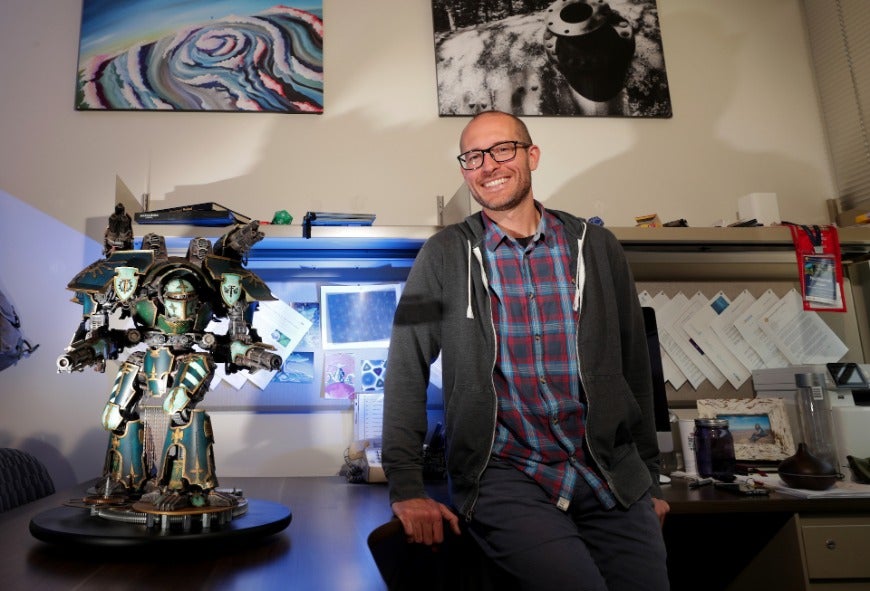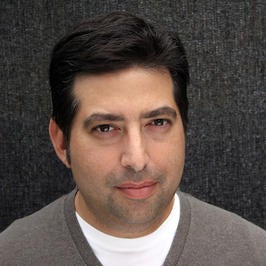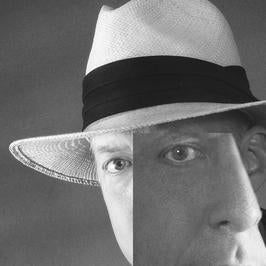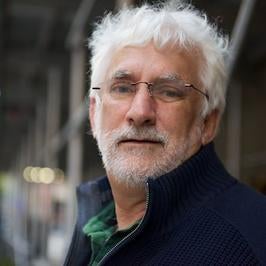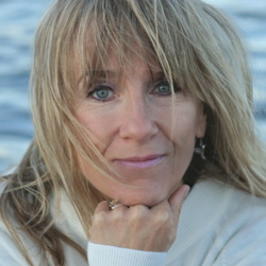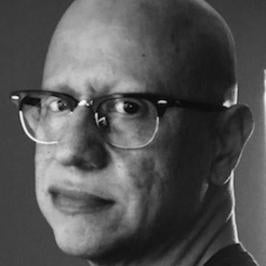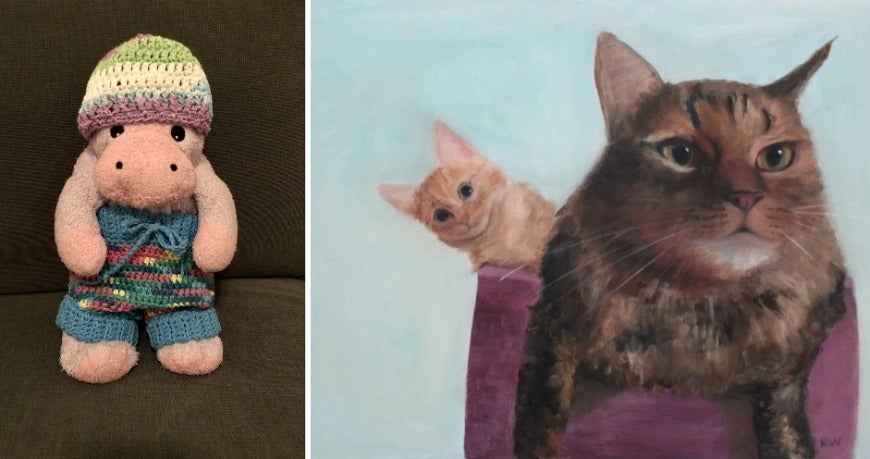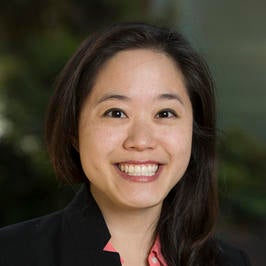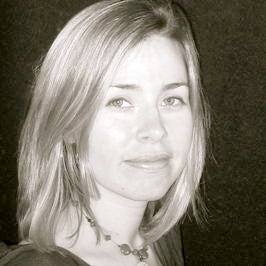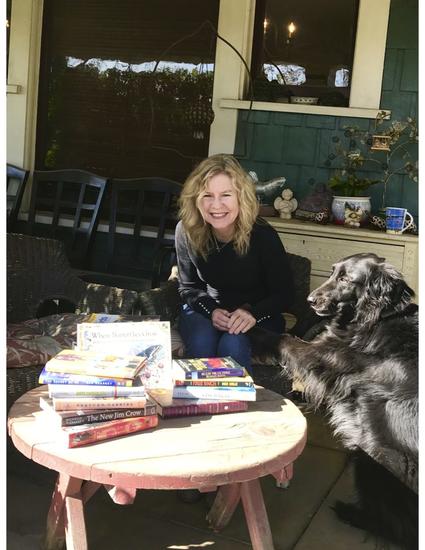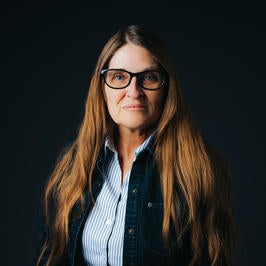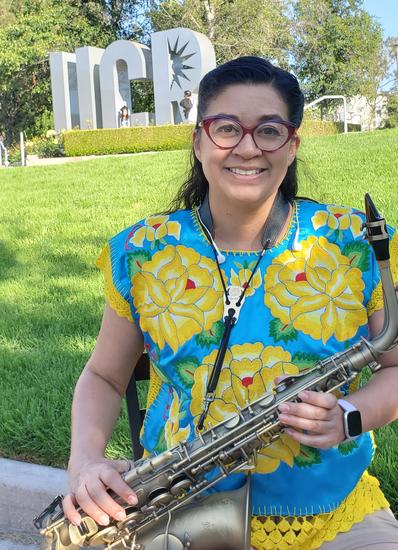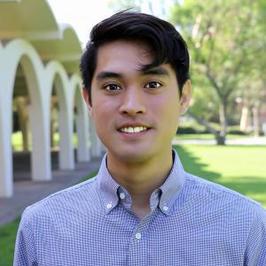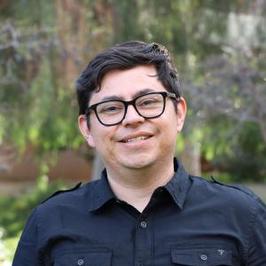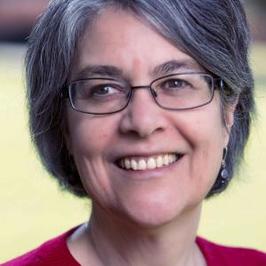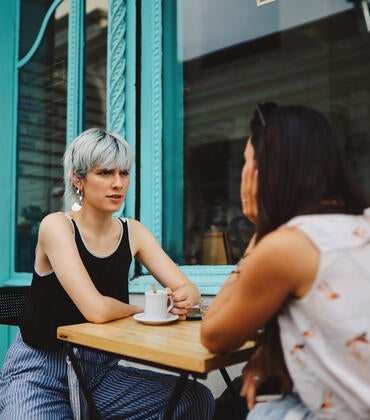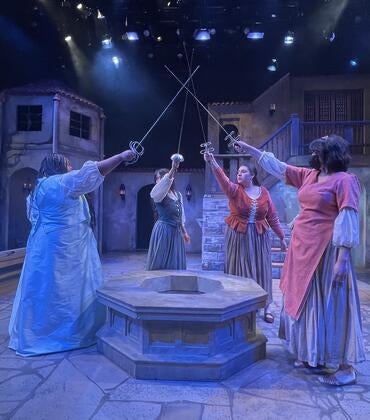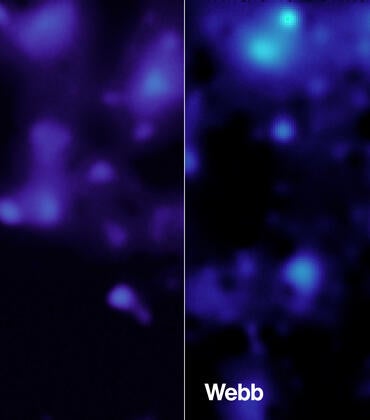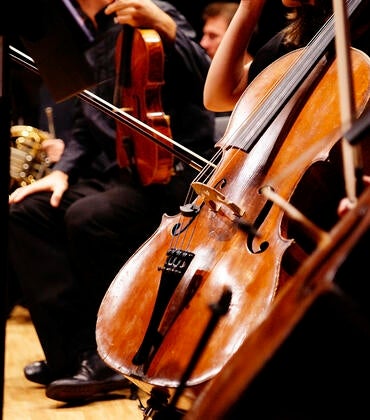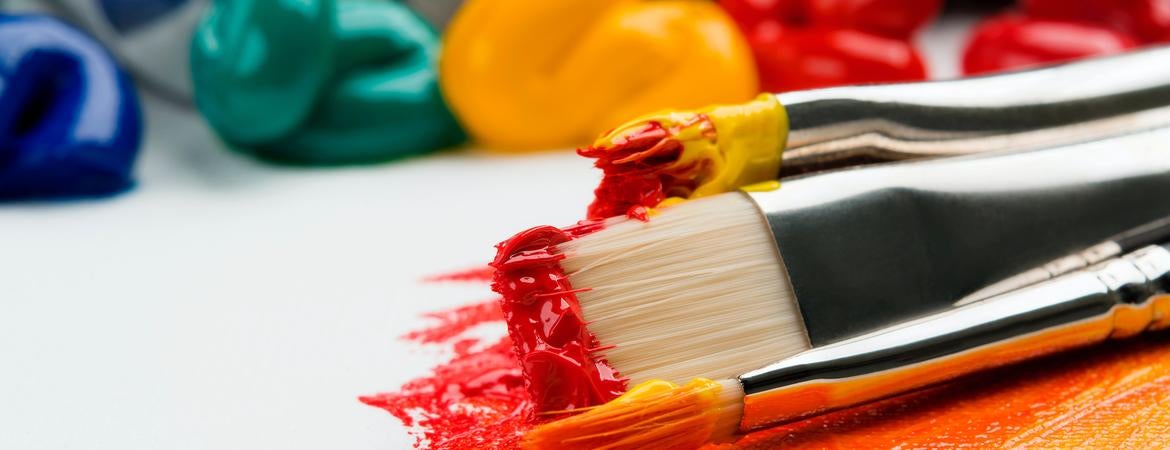
As the coronavirus pandemic continues across the U.S., many are finding that discovering and engaging in creative hobbies offers a welcome outlet for stress and anxiety. But sustaining the motivation to create during times of high stress can be challenging. Members of the UCR community share the ways they have been exploring their own creativity during this time, where they are finding inspiration, and tips on how to maintain a drive to create through times of uncertainty.
Modeling monsters
Nathaniel Gabor spends his free time building and intricately painting scale models for the tabletop game "Warhammer," like the sculpture of a 'titan' seen above.
Nathaniel Gabor
Faculty, physics
As a scientist, I am used to focusing on big projects requiring deliberate effort, which may often take several years to complete. To balance this, I find it important in my personal life to keep small projects that are impulsive and that can be completed quickly. For me, tabletop miniature gaming (a game called Warhammer 40,000) has been the perfect outlet for this, as it offers everything from strategic thinking and friendly banter to artistic expression and handcraft. I often spend hours modelling and painting highly detailed scale models of genetically enhanced superhuman soldiers and terrifying monstrosities from parallel horror realms. Some of the models I create myself, while others are based on scale model kits. The hobby is designed for a range of experience levels, and some people (like myself) have been doing this since the last century.
I keep a blog of my creations in this unusual hobby, and I am now part of an international community of ‘makers’ who evolve the hobby forward with new ideas coming from traditional artistic media to model railroading and scale modelling. I suspect that to many academics, it all seems like a waste of precious time, but I have found that it forces me to not take myself so seriously all the time (It turns out there are several scientists on campus that also play Warhammer 40,000, but I won't name any names here). Perhaps with no surprise, I have been quite busy over the past several months as we all adapt to living in our homes full time, but I always set aside lots of time to build, paint, and create.
Gabor is an associate professor of physics and astronomy. In 2019, he was one of two UC Riverside professors awarded the Presidential Early Career Award for Scientists and Engineers, the highest honor bestowed by the U.S. government for scientists and engineers at the beginning stages of their careers.
Being frank
Tod Goldberg
Faculty, creative writing
Having a book due in the middle of a pandemic is a good reminder that, at some point, there will be an end to this part of our life, so for the first portion of this time at home, I didn't have the luxury of looking for inspiration...either I wrote or I had to give the money back! But the fact is, too, that grief and trauma either make you feel isolated in your emotions or they cause you to reach out and find others who feel likewise — for me, it's the reaching out that has helped immeasurably.
I find the emotional vulnerability of both friends and strangers strangely inspiring — people saying precisely what they’re feeling instead of just saying they’re doing well or they’re fine or they’re great forces us all to reckon with the reality of our lives and to truly ponder our personal choices, all of which is the lingua franca of writing fiction, too. Which is to say: what has inspired me most is having frank conversations, not being afraid to admit frailty or failure or, of course, joy and then listening acutely to what other people are saying as well. Time may seem meaningless right now, but emotion does not and that's been valuable for me, creatively.
Goldberg is a professor of creative writing and directs the Low Residency MFA in Creative Writing & Writing for the Performing Arts. He is the New York Times bestselling author of over a dozen books, including “The Low Desert,” which will be released in February 2021.
Getting to work
Hear photographer Douglas McCulloh's thoughts on creativity.
Douglas McCulloh
Staff, UCR ARTS
Be well-read. Be curious about everything. Figure out who you are. Never advise others about how to stay creative and inspired during a pandemic. Whenever you encounter a rule, break it just to see what happens. Don’t be a jerk. Pick projects you are obsessed with. Chase them endlessly. Do what you say you’ll do. Surprise yourself at least once a day. Keep secrets. Work ceaselessly. Finally, follow the words of artist Chuck Close: “I always say that inspiration is for amateurs; the rest of us just show up and get to work.”
McCulloh is a photographer and the senior curator of UCR ARTS’ California Museum of Photography.
Finding motivation through collaboration
John Schimmel
Faculty, creative writing
I am embracing the need to avoid pushing myself into currently impossible territory. Of the half-dozen projects on the burner right now, four are collaborations and two are solos. The collaborations are going swimmingly; the solos are stalled. I think it’s because the collaborations somehow insulate me from the paralyzing swamp of rage into which my brain too easily sinks these days.
The collaborations also come with the expectations of others, which helps with discipline, while the solo process has no bumpers to protect my mind from collision. I’m doing a lot of reading on quieting the mind and part of what I’ve taken from that is permission to do the work that seems currently possible and important and accept the decelerated pace of the rest.
Schimmel is part of the core faculty at the UCR Low-Residency MFA in Creative Writing & Writing for the Performing Arts, the senior producer of narrative content at Cloud Imperium Games, and executive producer of the feature film “Foster Boy” and the documentary “The Great 14th: Tenzin Gyatso, the 14th Dalai Lama in His Own Words.”
Rediscovering joy in song
Bella Merlin
Faculty, theatre
One of the silver linings of “shelter in place” has been reconnecting with singer-songwriting. Over the years, I'd subtly found myself undervaluing songwriting as a creative practice, thinking it was less relevant than writing books or acting on stage and screen. Yet it's actually immensely restorative.
First of all, there’s the curiosity of taking an experience or feeling, fashioning it into a story that weaves together word, rhythm and melody, and then crafting it into something that can be shared performatively in three or four minutes. Secondly, it doesn't need much — just your imagination, your voice, and maybe an instrument. Thirdly, there’s the joy of filling your lungs with oxygen and belting out a number!
Everyone has a story to tell. Everyone has a song inside them. And it doesn't have to top the charts or win a Grammy! But it can express how you’re feeling in a way beyond conversation. And you may find — like me — that even your pets like to listen or join in!
Merlin is a professor of acting and directing. You can hear some of her songs at bellamerlin.com. Her recent book with co-author Tina Packer, “Shakespeare & Company: When Action is Eloquence,” can be purchased in Routledge's mid-year sale.
Phoning a friend
Alex Espinoza
Faculty, creative writing
Reaching out and having meaningful telephone conversations with other writer friends has been helpful right now. Zooming can get tiring, as we all know, so I've found that calling friends (as opposed to texting or messaging via social media) on a phone has helped me feel a little less unmoored. I've also been handwriting letters to mail to friends both near and far.
These steps, I've found, give me an opportunity to pause, to reflect, and to help keep the connections to people I value thriving. I've also been taking the time to do quick meditations throughout the day to ground and center me and help me keep in tune with my creative energies.
Espinoza is the Tomás Rivera Endowed Chair in Creative Writing. His latest book is “Cruising: An Intimate History of a Radical Pastime.”
Creating for a cause
Rachel Wu has kept busy crocheting baby clothes and painting during the pandemic.
Rachel Wu
Faculty, psychology
I paint (usually people and animals) and recently started learning how to crochet so that I can make little clothes for new parents. I have found that my drive to create comes from seeing how my creations can make someone’s day a little brighter. There are days and weeks when I am overwhelmed with loss that so many are experiencing. But when I focus on how my actions can help others, it makes the situation a bit less depressing and uncertain.
I've also recently adopted a view that assumes that we will be in this situation for at least a year, as opposed to waiting for a temporary situation to switch back to the way things were. I have found that this view has allowed me to create longer-term solutions (e.g., setting up a more permanent creative workspace) and a scheduled routine to be more creative, comfortable, and productive.
Wu is an assistant professor of psychology. Her team is currently conducting a study looking at how learning new skills, including creative skills, may help build resilience. Learn more about their research at callalab.com. To view some of Wu’s creative work, visit rachelwu.com.
Using isolation as inspiration
Katie Ford
Faculty, creative writing
Luckily, creativity often thrives in less-than-perfect conditions. Duress, at least for poets, is often the flashpoint for new work. So is upheaval, which brings with it the task of reimagining how to make a life. A writer will have to be able to tolerate solitude someday in order to write a book, so this time of isolation could be viewed as a kind of crucible toward that lifelong skill. I think if we can face this time believing something new and unforeseen isn’t just possible, but likely — in our creative work, in our reading, in our protest, in our signing of petitions — then we can feel a bit of hope. As for what helps me stay steady? Pulling weeds, reading novellas and books of poems, and being with my students, even if it has to be over Zoom.
Ford is a professor of creative writing. Her most recent book is “If You Have to Go.” Excerpts at fordkatie.com.
Embracing family and community
Susan Straight
Faculty, creative writing
Since March 17, when the Riverside area shut down, I've thought a lot about creativity, and how to keep narrative, imagination and story going for me as a writer. It turns out that I am less alone than ever — my middle daughter, Delphine, 29, and her husband Kunmi, 29, came here for two weeks in April to help pack up my parents’ 50 years of possessions for their move to assisted living. Three generations, looking at memories through furniture, photos, jewelry, and even handknitted afghans, were a revelation of history. We all worked remotely, in different rooms in the house.
Shortly before that, my next-door neighbor was hospitalized for 10 days with COVID, and so I helped his wife and four children by cooking and taking supplies to their porch — at night his wife and I would text about her fears, and that was another narrative. And lastly, having a big front porch meant I could write outside, with the dog, while my youngest daughter, Rosette, 24, could work inside; she came here a month ago. In the evening, we take Dairy Queen ice cream to my parents, in their assisted living. I walked by the Santa Ana River with my dog. And late at night, I finished my new novel out on the porch.
Straight a distinguished professor of creative writing and is the author of eight novels including “Highwire Moon” and “A Million Nightingales.” Her debut memoir, “In the Country of Women,” was published in August 2019.
(Photo by Marcia Bales)
Prompting creativity
Allison Hedge Coke
Faculty, creative writing
About the time we were moving to lockdown, I began composing a series of original daily prompts #poempromptsforthepandemic (IG & FB, 120+ to date) to assist others in making time to be creative and to focus interaction with the creative process, particularly in poetry. To offer readers the option to share the prompts with students, colleagues, seniors, patients, clients, family members, friends, or anyone in need. The prompts offered me a time every day to be concise and focused in their creation, as well.
My own new poems, such as Viscera in June's World Literature Today, have additionally come from concerns made more evident through witnessing others’ unexpected (and oftentimes really strange) responses to the pandemic overall. Fortunately, filtering impact is something artists/writers tend to do. Breathe in – inhale the nature of the discourse and create the piece of work from the interplay/inhalation, as new work – exhalation.
Hedge Coke, is a distinguished professor of creative writing, the 2020 Dan & Maggie Inouye Distinguished Chair in Democratic Ideals, a 2019 Fulbright scholar, and principal investigator for the project “Along the Chaparral: memorializing the enshrined.” Her recent books include “Burn” (2017, MadHat), and “Effigies III” (Salt PublicationsUK-Global/PenguinUS, 2019).
(Photo by Adrianne Mathiowetz)
Breaking away from technology
Brandon Williams
Lecturer, creative writing
I've been overwhelmed by the current online necessities — the proliferation of Zoom calls, asynchronous class videos, all-online assignments to be posted and graded, the constant barrage of emails — to such an extent that it feels almost impossible to sit in front of a screen for a minute longer than is absolutely required. As such, a lot of my creative work has taken place long-hand, and spontaneously, since the start of quarantine: on yellow legal pads that have been languishing in their wrappers for years or in the margins of books I'm rereading for the fifth time or on notecards that I keep finding in desk drawers or on the backs of printed-out story drafts. Really, anything but the blinking cursor, the always-there admonishment of word and page count, feels like an opportunity to focus more effectively on the work itself.
The other inspiration has come, as it always does, from reading: I've started working my way through recent award-winning novels, and have found so many new favorites, chief among them “Friday Black,” by Nana Kwame Adjei-Brenyah, which I've already recommended to about 15 people; “Freshwater,” by Akwaeke Emezi; and “Sabrina & Corina,” by Kali Fajardo-Anstine.
Williams is a lecturer in the Department of Creative Writing.
Keeping the music going
Xóchitl Chàvez
Faculty, music
Indigenous community members from Oaxaca and other Mexican heritage participants from across Southern California and Mexico were set to convene for a historic community-oriented all women master class of Oaxacan Brass Band tradition on April 4th at UCR. Despite the complications of the pandemic, fellow Oaxacan musicians and I turned to technology to give continuity to our transborder collaboration, where we recorded a collective music video of the cumbia entitled, “Mujeres” (2019). The collective video is a tribute to the work of the women in the philharmonic band "Viento Florido" of Santa Maria Tlahuitoltepec, Oaxaca, and as a way of sustaining the work that we have done together since the summer of 2018 organizing music retreats of Oaxacan women musicians. Our desire is to follow up on the projects that we share around musical training among women in California and Oaxaca from the virtual point of view until we have the conditions to carry them out physically in the same space.
The process of creating this video and holding monthly group video chats has been both cathartic as well as a learning experience of how we support one another with regards to access to internet in remote areas. We share this music video as a way to embrace each other until we can return to making music collectivity in person. The “Mujeres” video premiered on July 26 on Banda de Viento Florido social media platforms. “Mujeres” is the title track of the Viento Florido sophomore album “Mujeres” on Spotify and iTunes.
Chàvez is completing her book manuscript entitled, “The Guelaguetza: Performative Crossroads, Ethnicity, and Greater Oaxaca.” Her most recent publication is “La creación de Oaxacalifornia mediante tradiciones culturales entre jóvenes oaxaqueños de Los Ángeles, California.” To learn more about Dr. Chávez’ community-engaged research visit xochitlchavez.com and boomingbandas.com.
Changing environments
Ray Gonzalez
Staff, UCR Library
There are two ways that help me stay creative and inspired: a change of environment and learning something new. Sometimes (especially during the COVID-19 pandemic) staying in one room/environment for too long can make me feel stuck and uninspired, so I try to change my environment every once in a while to feel refreshed. Changing your environment could mean working/creating outdoors instead of inside, using a different room, or even rearranging and reorganizing your room. Decluttering my work/creative space has also been very helpful.
Another way that helps me stay creative and inspired is learning something new. This could be a skill, a concept, a tool, software, or trying a creative outlet that you have never tried before. You can learn by following a tutorial online, watching videos on YouTube, or even by trying to recreate what someone else has done (and then doing it again in your own way). I’ve also found it extremely helpful to collaborate with and learn from others. Learning something new can be that missing ingredient that will complete your recipe of creativity.
One personal project that I just started is using an Arduino board, micro servo motors, and a laser diode to make a simple 3-axis laser-pointing robot that points a laser at different places on the floor for my dog to chase. Another personal project that I have been working on uses Blender for its visual effects features. My niece’s favorite Disney Princess is Elsa, so I’m using Blender’s particle system, motion tracking feature, and animation feature to give her Elsa’s ice powers and make it look like she is magically building Olaf the snowman, all while she is singing “Let It Go”.
Gonzalez is the maker services coordinator for the Creat’R Lab at UCR’s Orbach Science Library. The Creat’R Lab is an innovative learning environment for students, faculty and researchers which includes 3D printers, 3D scanners and associated software, basic hand tools, electronics for prototyping, tools for working with textiles, and more.
Learning new skills
Alvaro Alvarez
Staff, UCR Library
Stress and anxiety during these harsh times are unavoidable. Most people find peace through meditation, eating, exercise, etc. For people like me, making has become a blessing in my life even before the Covid-19 pandemic. During these times of social separation and distancing I have found that creating and making has been a time where I forget about the craziness of the world and focus on the task at hand.
In the chaos I first found the opportunity to make masks from material I had at home. This was my first project when the lock down began since I had no access to 3D printers, or other high-tech machinery from work. Through this project I have learned to sew and use a sewing machine, something that otherwise I would probably never have attempted. Building on this new skill set I now plan to use old shirts to make a quilt in the upcoming weeks. Making has been a really good form of stress relief for me because it forces me to focus my mind and energy into something productive that can be fostered into a stronger skill set for future projects. Sometimes in all the craziness people can find something good, or an opportunity to grow in some shape or form. I believe that making can help people cultivate themselves and come out a new person post COVID-19. Hopefully more people can find inspiration and continue to move forward with a peaceful mind and soul through making.
In the coming weeks I will be finishing up painting and weathering of my BB-8 life-size droid model. This project was set aside for a little over a year now because of time and money constraints. Because of working from home, I have been able to save money and I now have more time at home to continue thankfully, so I am really excited to see how far I can get.
Alvarez is the innovative media librarian for UCR Library.
Keeping it relevant
Ann Frenkel
Staff, UCR Library
The mid-March lockdown saw me sheltering together with my bi-continental spouse (Riverside and Warsaw, Poland) Gwido Zlatkes. In the “before times” we are co-translators, and indeed we were on deadline doing final edits for a book manuscript. However, our suddenly constrained quarantine left us feeling unfocused and restless. However, fate provided us with an outlet both familiar and relevant.
Our friend Barbara (Basia) Lityńska in Warsaw had immediately responded to the Polish lockdown (which started slightly earlier than here) with poetry — a cycle called, “Poems in the Time of Quarantine.” Basia is a poet and actress with the condition of Down Syndrome. As Basia turned to poetry, we turned to translation and performance — something that felt normal to us, but also let us respond to the pandemic through words and music. Every night, we would translate a poem in the cycle and would video ourselves on my iPhone reading it in Polish and then in English, while I provided piano accompaniment. Then we posted it to Facebook—10 videos in all. The poems, translations, and videos can be found at vigodapress.com/quarantine/.
Basia’s poems are honest and direct, and even uncomfortable. But they express feelings that I suspect we all have had (and continue to have) during this very strange time. Gwido is currently back in Poland where the country is emerging from lockdown. He is working on getting Basia’s quarantine poems published in a print edition (in Polish). Perhaps an English or bilingual edition will also come to pass.
Continue doing the work you always have done and that you understand — but find ways to make it relevant and responsive to the current situation.
Frenkel is the deputy university librarian for UCR Library.
